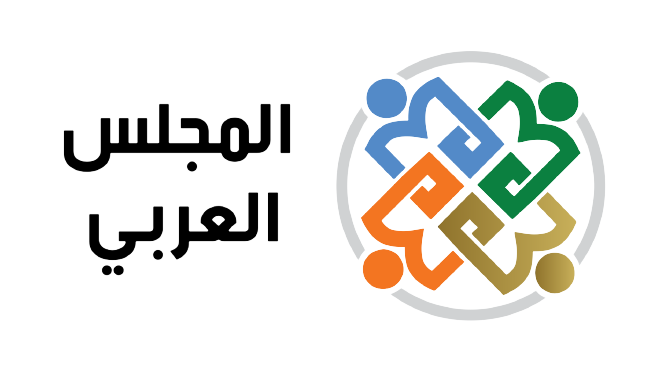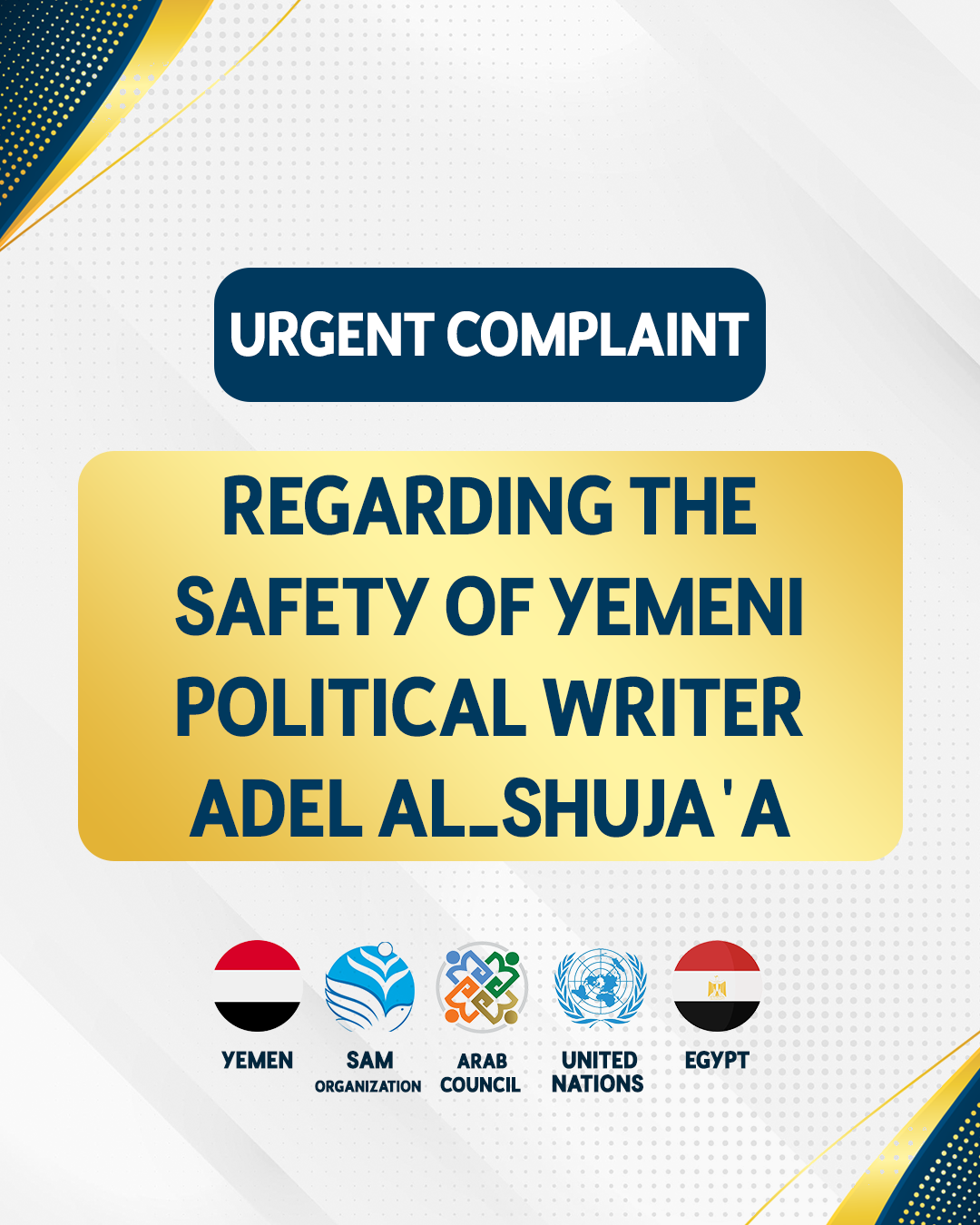Submitted on September 25, 2023,
Submitted by:
Sam Rights and Freedoms Organization
The Arab Council Foundation
Your Excellencies,
The Working Group on Arbitrary Detention;
The Special Rapporteur on Torture; the Working Group on Enforced or Involuntary Disappearances;
The Special Rapporteur on the Independence of Judges and Lawyers;
The Special Rapporteur on Extrajudicial, Summary or Arbitrary Executions;
The Special Rapporteur on the Promotion of Truth, Justice, Reparation, and Guarantees of Non-Recurrence;
The Special Rapporteur on Human Rights Defenders; the Special Rapporteur on Violence Against Women and its Causes and Consequences;
The Special Rapporteur on Freedom of Opinion and Expression;
The Special Rapporteur on the Freedom of Association and Peaceful Assembly
Your Excellencies,
This report has been prepared by a group of lawyers and human rights advocates working with the Sam Rights and Freedoms Organization in collaboration with The Arab Council Foundation. This urgent report aims to shed light on the case of the arbitrary detention of Yemeni political writer Adel Al-Shuja’a.
1. On Monday, September 18, 2023, Egyptian authorities arrested Mr. Adel Al-Shuja’a from his residence in Cairo. His passport and mobile phones were confiscated during the arrest, and he was taken to the Urban Police Department. Subsequently, he was transferred to an unknown location and spent an entire day disappearing from his family before being brought before the public prosecutor.
2. This incident raises serious concerns about the safety of Mr. Adel Al-Shuja’a, especially in light of the request from the Yemeni government to deport him to Aden. It is important to note that he entered Egypt legally and had a valid residency status. This could expose him to the risk of torture or persecution at the hands of the Yemeni government upon his return to his home country.
3. We, as a group of lawyers and human rights advocates, call for urgent intervention by relevant authorities and international organizations to investigate and closely monitor this case. We also request the assurance of Mr. Adel Al-Shuja’a’s safety and the prevention of his forced return to Aden or any other location where he may be at risk.
4. Members of the Egyptian security forces arrived at our home early in the morning and took my father, Dr. Adel Al-Shuja’a, to the Urban Police Department. The police treated us respectfully and told us they would take my father for questioning and that we would be reunited shortly. Subsequently, we were taken to the police station, where they assured us that the matter was minor and would be resolved by noon when my father would appear before the prosecutor to give his statement and return home. They advised against hiring a lawyer for him. When we asked them about the reason for his detention, they simply mentioned his Facebook posts without specifying which posts exactly, despite our repeated requests for clarification.
5. The victim’s son spoke while documenting his testimony : My father did not appear before the prosecutor as promised, and we waited for him in vain at home. When we inquired with the police station about his whereabouts again, they claimed he was not there. However, he was presented to the public prosecutor the following day, and he has not been released.
6. Moreover, Dr. Al-Shuja’a informed his lawyer that the internationally recognized Yemeni government is seeking him due to his political writings and continuous criticism of the government’s performance. This decision carries severe risks and poses a real threat to the life of the political writer Al-Shuja’a. Ahmed Maher, a journalist who was arbitrarily detained by non-state military formations controlling the city of Aden and receiving support from members of the Presidential Council, remains in custody. He has endured severe torture in the prisons of these forces and has not been brought to trial. According to the testimony of his brother, who was also detained with him before being released, Maher suffered brutal torture, resulting in visible signs of distress, as evidenced in a recording in which he appeared fatigued due to the torture endured.
7. Nonrefoulement is a binding principle in international law that prohibits states from returning individuals to a place where they may face the risk of torture, other forms of cruel, inhuman, or degrading treatment, or serious violations of human rights. This principle is essential to protecting human rights and refugees under international law.
Under the principle of non-refoulement, states are required to:
1). Prevent the forced return of individuals who may be at risk if returned.
2). Grant any person threatened with forced return the right to access legal counsel and an opportunity to defend their rights.
3). Allow international organizations and representatives of the United Nations High Commissioner for Refugees (UNHCR) to monitor and intervene if necessary in cases of forced return.
This principle aims to ensure the protection of human rights and refugees and to prevent them from being exposed to risks in cases of forced return. It reflects states’ commitment to international obligations related to human rights and the right to seek asylum.
8. The internationally recognized Yemeni government has a documented history of systematic torture and enforced disappearances. It controls areas including Aden, Hadramout, Shabwa, and Al-Mahrah, where military formations and security units have been established outside the legitimate government’s Ministry of Defense and Interior framework. The United Arab Emirates supports these formations and engages in widespread violations of international law and international humanitarian law. They operate illegal prisons outside the judiciary’s oversight, where enforced disappearances and systematic torture occur. Sam Rights Organization, several local and international organizations, and a team of prominent experts have documented dozens of torture cases in the prisons under the control of these formations in Aden, Hadramout, Shabwa, and Al-Mahrah. According to the expert team’s report, there are valid reasons to believe that the governments of Yemen, the United Arab Emirates, and Saudi Arabia are responsible for human rights violations, including enforced disappearances. Most of these violations appear to be linked to the conflict. They may rise to the level of war crimes, including rape and/or cruel, inhuman, or degrading treatment and/or torture and/or violations of personal dignity.
9. The Egyptian authorities are obliged to provide Dr. Al-Shuja’a with the opportunity to communicate with lawyers and international organizations to seek a safe haven for him and his family in the event of his deportation.
10. The principle of non-refoulement is a binding customary rule in international law that prohibits states from returning individuals to a place where they may face the risk of persecution or other serious violations of human rights. Individuals at risk of deportation must be allowed to access legal counsel, meet with representatives of the United Nations High Commissioner for Refugees (UNHCR), and challenge their deportation before a court.
11. According to Article 3 of the United Nations Convention Against Torture, to which the Arab Republic of Egypt is a signatory, it is prohibited to extradite, expel, return, or forcibly transfer Dr. Adel Al-Shuja’a to the Yemeni government or forcibly repatriate him to Yemen if there are substantial grounds for believing that he would be in danger of being subjected to torture.
12. Such actions would be considered arbitrary detention, as outlined in Category III, if there is non-compliance, either in whole or in part, with international rules related to the right to a fair trial, as specified in the Universal Declaration of Human Rights and relevant international instruments accepted by the concerned state. Such actions are deemed to be of a serious nature, adding an arbitrary character to deprivation of liberty.
13. Sam Rights Organization and The Arab Council Foundation urge the Egyptian authorities to provide Dr. Al-Shuja’a with the opportunity to leave Egypt and seek residence in a safe country, by his valid Spanish residency, which was confirmed by his wife on Balqees TV. It is essential to uphold the principle of non-refoulement for individuals facing potential persecution and to allow international entities to assist in finding a secure place for him and his family.
Recommendations to the Egyptian Government:
1. Cooperation with the International Community: Call upon the Egyptian government to cooperate with international organizations and human rights institutions to investigate the case of Adel Al-Shuja’a and closely monitor his well-being.
2. Ensure His Safety: Ensure the safety and protection of Adel Al-Shuja’a, preventing torture, inhumane treatment, or humiliation.
3. Fair Trial: Guarantee Adel Al-Shuja’a’s right to a fair and transparent trial if he is accused of any crimes, allowing him a proper defense.
4. Release of Unjustly Detained: If there is insufficient evidence for charges, consider the immediate release of Adel Al-Shuja’a.
5. Refrain from Forced Repatriation: Commit to not forcing Adel Al-Shuja’a to return to Yemen if his life is at risk.
6. Transparency and Media Access: Allow journalists and international observers to visit Adel Al-Shuja’a and gain a clear picture of his condition.
7. Investigation and Accountability: Conduct a thorough investigation into his detention and address any violations that may have occurred.
8. Human Rights Commitment: Remind the Egyptian government of its commitment to human rights and international obligations.
9. Political Dialogue: Seek political solutions to international and regional issues that contribute to improving relations between countries.
10. Regional Cooperation: Enhance cooperation with regional countries to peacefully and diplomatically resolve political and humanitarian issues.
Recommendations to the Yemeni Government:
1. Respect International Law: Uphold international law that prohibits forced repatriation and refrains from requesting other governments to return Yemeni citizens who oppose its policies.
2. Diplomatic Efforts: Initiate diplomatic efforts to negotiate with the Egyptian government regarding the case of Adel Al-Shuja’a and ensure his non-forced repatriation to Yemen.
3. Legal Support: Provide legal support and assistance to Adel Al-Shuja’a to safeguard his legal rights and ensure proper legal representation.
4. Engage with the International Community: Call upon the international community and international human rights organizations to support efforts to prevent forced repatriation and advocate for the release of Adel Al-Shuja’a.
5.International Engagement: Encourage international human rights organizations and governmental international bodies to monitor Adel Al-Shuja’a’s case and intervene if necessary.
6. Media and Public Awareness: Launch media campaigns to raise awareness about Adel Al-Shuja’a’s case and advocate for his rights through media outlets and social media platforms.
7. Maintain Security and Safety: Collaborate with other countries to ensure the safety and security of Adel Al-Shuja’a and prevent any security threats against him.
8. Pressure for Political Issue Resolution: Work towards a political settlement in Yemen and resolve the internal conflict, which can improve the country’s humanitarian and political conditions.
9. National Dialogue: Promote a comprehensive national dialogue that includes various political and societal factions in Yemen to seek solutions to political and social issues.
10. Collaboration with Human Rights Organizations: Collaborate closely with local and international human rights organizations to enhance and protect human rights in Yemen.
11. Compliance with International Laws and Treaties: Commit to international human rights treaties and relevant international laws and ensure effective implementation in Yemen.


